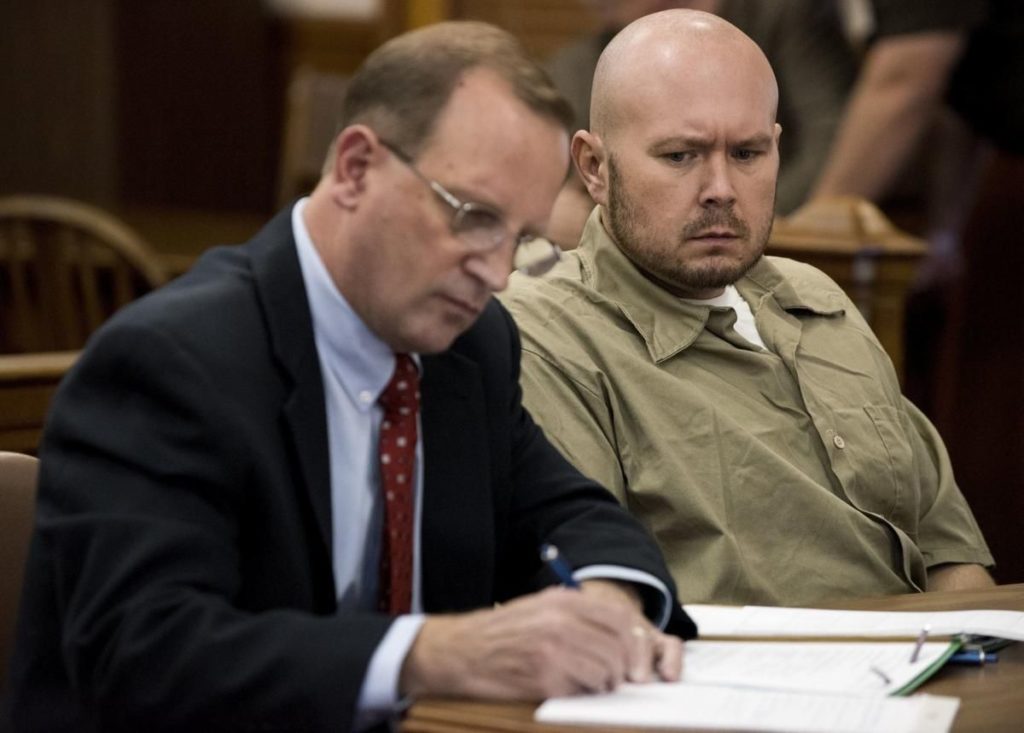LINCOLN — Defense attorneys are alleging that the wrong person has been charged in the 2010 disappearance and death of Peru State College student Tyler Thomas.
Lawyers for former Peru State College student Joshua Keadle have put forth an alternative theory of what happened to Thomas, just a month before Keadle is scheduled to stand trial in Thomas’ slaying.
Keadle’s lawyers contend that another man, an alleged sex trafficker, told a young woman that he and two other men killed Thomas. The trafficker took the young woman to a remote boat dock along the Missouri River, where he sexually assaulted her and told her “this is the area” where he buried Thomas’ body, Keadle’s lawyers said.
The assertion, which was discredited by criminal investigators during a court hearing on Wednesday, throws a new twist in one of the state’s most well-known cold cases. Details of the latest development in the case are included in a transcript of the hearing obtained by The World-Herald.
Thomas, the 19-year-old captain of the college dance team, vanished after leaving an early morning, off-campus party on Dec. 3, 2010.
Keadle, now 37, initially said he didn’t know anything about Thomas’ whereabouts that night. But later, he said that he went to a boat dock near Peru to smoke marijuana where he encountered Thomas. He said he offered her a ride to Omaha in exchange for a sexual favor, then, after a sex act, changed his mind.

Thomas exploded in anger, according to statements Keadle gave investigators. She threatened to accuse him of rape and tried to hit him. He said he grabbed her by the wrists, then eventually drove back to his dorm without her. Thomas was never seen again, nor was her body found.
While Keadle was quickly identified as a person of interest, he wasn’t arrested in connection with the slaying until almost seven years later. In the interim, he was convicted of sexually assaulting a 15-year-old girl in Dodge County and sentenced to 15 to 20 years in prison, and he was found responsible for Thomas’ death in a wrongful death civil lawsuit brought by her family.
When Keadle was arraigned last year in Thomas’ death, he pleaded not guilty. His attorneys said the circumstantial evidence presented by prosecutors only showed that Thomas was dead, not that Keadle killed her.
But prosecutors presented testimony from a former jail mate, who said Keadle told him that he had taken Thomas down to the river and had sex with her at the boat ramp, adding that “they would never convict him because they would never find her body.”
Then came the court hearing Wednesday on motions by Keadle’s attorneys to throw out evidence gathered in searches of his vehicle immediately after Thomas’ disappearance and in 2016, as well as the FBI’s search of his cellphone in 2012.
Among the arguments raised by the defense attorneys was that when an investigator asked for a search warrant in December 2016 to re-examine Keadle’s Ford Explorer, he failed to mention that an alternative theory had been presented nine months earlier.
A judge needs probable cause to issue a search warrant, but was not informed that someone other than Keadle might have confessed, which represents “deliberate falsehoods or reckless disregard for the truth,” argued Keadle’s court-appointed attorneys, Jeff Pickens and Matthew McDonald of the Nebraska Commission on Public Advocacy. Thus, they said, the items found in the search warrants should be suppressed.
But investigators who testified at last week’s hearing said the young woman who told them about the alleged confession was not a credible source.
Mike Maseth, an FBI investigator in Lincoln, said her story didn’t make sense to him, after he and sex trafficking investigators with the Office of Homeland Security visited the boat dock area with the woman in April 2016.
He said the woman led them to the area where she said she was raped. She said she was shown a body in a barrel, and told that the alleged trafficker and two other men had killed Thomas. She said she was told they had buried Thomas’ body at that site sometime after floodwaters had receded, when the trees were bare of leaves.
That created a timing problem, because Thomas disappeared in 2010, and the Missouri River flooded in 2011. Maseth said it seemed improbable that someone would have held onto her body for almost a year, until fall 2011, when floodwaters finally receded. In addition, a cadaver dog didn’t “hit” on a buried body, the FBI agent said. Additionally, the young woman was a “shell of a person” who appeared traumatized by the sex trafficker, he said.
But Maseth, under questioning by Keadle’s attorneys, acknowledged that it was possible Thomas could have been held for a year in a sex trafficking scheme. Considering the entirety of the story given by the woman, though, he didn’t find it credible.
What happens next is unclear. The young woman who told the story about three men killing Thomas could testify at the trial. But her testimony would be secondhand, which casts doubt on it.
The alleged sex trafficker cannot testify, because he died in 2017, according to court records.
On Monday, Keadle’s attorneys filed a request to delay the trial, which had been scheduled to begin on April 8.
District Judge Ricky Schreiner had not ruled on that motion as of Monday evening, or the motions to suppress the evidence gathered in the searches, according to Amy Hector, Nemaha County clerk of the district court.



